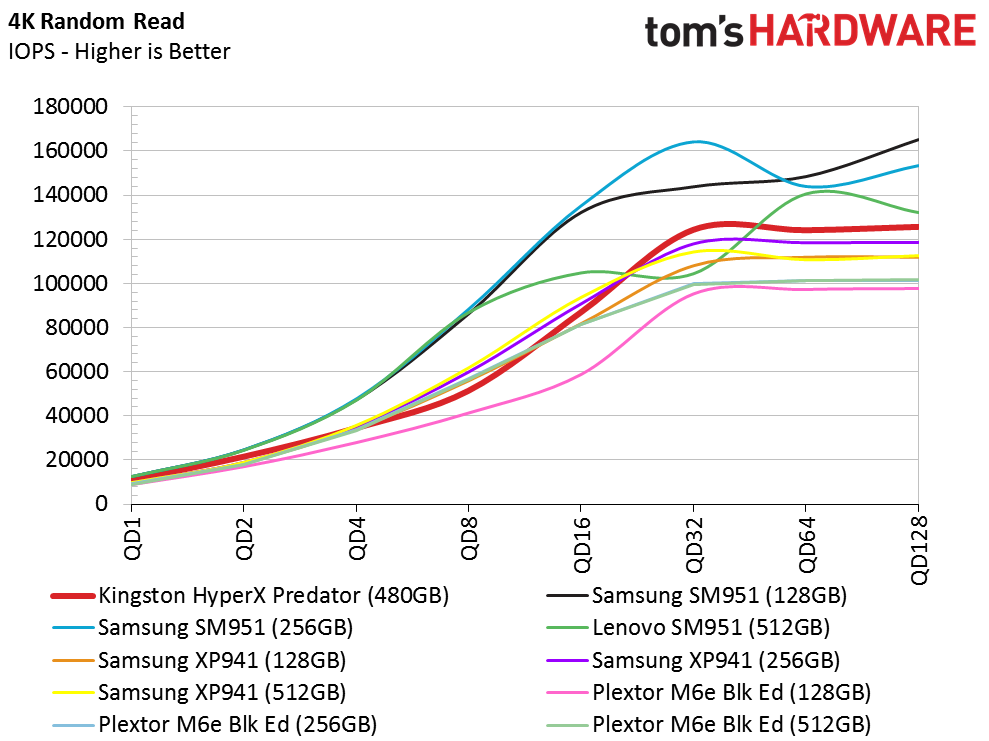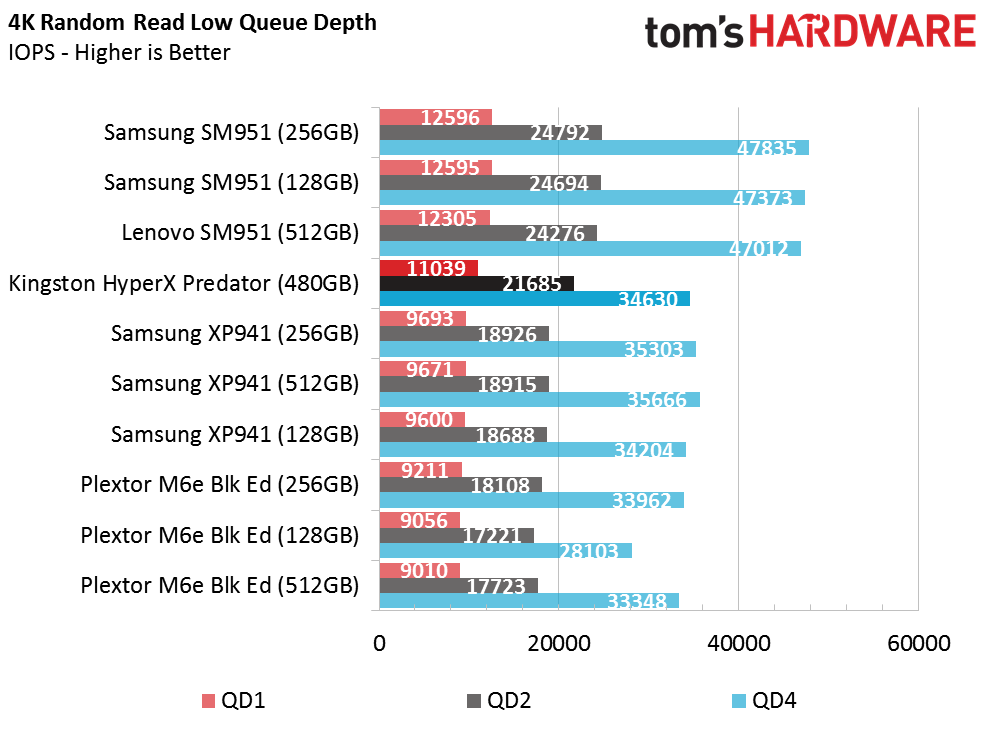Kingston HyperX Predator 480GB m.2 PCIe SSD Review
Reviews
By
Chris Ramseyer
published
Why you can trust Tom's Hardware
Random Read
Image 1 of 2


Sadly, 4KB random performance is only marginally better than the previous-generation controller. The Predator does surpass 10,000 random read IOPS at a queue depth of one, which is a number we often use to separate excellent client performance from good performance. Kingston also manages to extract good numbers from the 88SS9293 processor as queue depth grows.
Stay On the Cutting Edge: Get the Tom's Hardware Newsletter
Get Tom's Hardware's best news and in-depth reviews, straight to your inbox.

Contributor
Chris Ramseyer was a senior contributing editor for Tom's Hardware. He tested and reviewed consumer storage.
31 Comments
Comment from the forums
-
blackmagnum A fast and furious SSD most suited for desktops, but doesn't work well with mobile notebooks? I don't know how Kingston will be able to compete with this product!Reply -
mapesdhs "After using the software, you simply tell the BIOS to boot from the Kingston SSD and everything works as it should."Reply
After first disconnecting the old device though, because otherwise Windows won't boot - it assumes the presence of another Win inst with the same ID is suspicious. I'm surprised this isn't mentioned more often when free cloning sw is highlighted in an SSD's accessory package.
Re pricing, the tiny difference between the M.2 and PCIe versions shows just how much one gets ripped off when buying other types of HBA, given Kingston is happy for the gap to be just $12, though I don't get why the gap is larger for the 480GB when it's the same item that's excluded for the M.2 version.
Personally, depsite the performance of this device, the small warranty would put me off.
Ian.
-
mapesdhs Reply15881456 said:How about adding nvme based Intel 750 400gb SSD to the equation?
Yes, that and one good standard SATA3 for comparison, preferably the 850 Pro 512GB.
Btw, is it just me for whom all the thumbnail images in the results galleries are blank?
Ian.
-
milkod2001 it might be easier for readers to understand if you stick with just numbers instead of millions of colorful lines all over the place.Reply
it would be nice to have comparison with regular SSD. Is it better than that. I can't tell from this review :( -
CRamseyer ReplyHow about adding nvme based Intel 750 400gb SSD to the equation?
At the time I didn't have the Intel SSD 750 400GB. I do now and the review should come out very soon. -
CRamseyer Replyit might be easier for readers to understand if you stick with just numbers instead of millions of colorful lines all over the place.
it would be nice to have comparison with regular SSD. Is it better than that. I can't tell from this review :(
I'm just about finished with an article that puts the SM951-NVMe and SM951 AHCI against an 850 Pro.
Even without the data to compare in this review we know that the 850 Pro (512GB and 1TB) does roughly 550 MB/s sequential read, a bit over 500 MB/s sequential write, 98K random read IOPS and roughly 90K write IOPS in my testing.
If you compare equal capacity sizes, nearly every product in this review performs better than 850 Pro.
I'm up against a hard limit of the number of products I can put in the charts without needing a magnifying glass to look at the data. I'll see about coming up with something a little better for the Best of SSD Monthly column.
-
milkod2001 Replyit might be easier for readers to understand if you stick with just numbers instead of millions of colorful lines all over the place.
it would be nice to have comparison with regular SSD. Is it better than that. I can't tell from this review :(
I'm just about finished with an article that puts the SM951-NVMe and SM951 AHCI against an 850 Pro.
Even without the data to compare in this review we know that the 850 Pro (512GB and 1TB) does roughly 550 MB/s sequential read, a bit over 500 MB/s sequential write, 98K random read IOPS and roughly 90K write IOPS in my testing.
If you compare equal capacity sizes, nearly every product in this review performs better than 850 Pro.
I'm up against a hard limit of the number of products I can put in the charts without needing a magnifying glass to look at the data. I'll see about coming up with something a little better for the Best of SSD Monthly column.it might be easier for readers to understand if you stick with just numbers instead of millions of colorful lines all over the place.
it would be nice to have comparison with regular SSD. Is it better than that. I can't tell from this review :(
I'm just about finished with an article that puts the SM951-NVMe and SM951 AHCI against an 850 Pro.
Even without the data to compare in this review we know that the 850 Pro (512GB and 1TB) does roughly 550 MB/s sequential read, a bit over 500 MB/s sequential write, 98K random read IOPS and roughly 90K write IOPS in my testing.
If you compare equal capacity sizes, nearly every product in this review performs better than 850 Pro.
I'm up against a hard limit of the number of products I can put in the charts without needing a magnifying glass to look at the data. I'll see about coming up with something a little better for the Best of SSD Monthly column.it might be easier for readers to understand if you stick with just numbers instead of millions of colorful lines all over the place.
it would be nice to have comparison with regular SSD. Is it better than that. I can't tell from this review :(
I'm just about finished with an article that puts the SM951-NVMe and SM951 AHCI against an 850 Pro.
Even without the data to compare in this review we know that the 850 Pro (512GB and 1TB) does roughly 550 MB/s sequential read, a bit over 500 MB/s sequential write, 98K random read IOPS and roughly 90K write IOPS in my testing.
If you compare equal capacity sizes, nearly every product in this review performs better than 850 Pro.
I'm up against a hard limit of the number of products I can put in the charts without needing a magnifying glass to look at the data. I'll see about coming up with something a little better for the Best of SSD Monthly column.
great thanks, im looking forward to that
im currently on Sammy 830 and just wanted to know if this product would give me more performance. I wanted to know what difference i will see in boot times, loading applications/games times and basically if it's worth to get PCI SSD over regular SSD in real world applications.
There's something which is not directly an issue of the review, something what you might want to forward to this site development team though. It's the slider arrows. Probably the biggest ever :) It's OK in this review but in many cases in overlaps important content. There might be an option to pick different styles with smaller arrows,make them visible only when hover over etc. I bit of CSS could easily do miracles :) -
BoredErica I would LOVE another article with trace-based analysis of game loads to figure out what type of load a game puts on a drive. I can't find a good tool to do it myself.Reply -
TechyInAZ Great drive! I'm planning on saving up for the 240GB version (unless better nvme drives come out soon).Reply
While the power usage is a little high compared to other m.2 drives, this drive is designed specifically for desktops (you can tell from PCIE adapters, to the looks of the drive, and the power consumption) not notebooks.